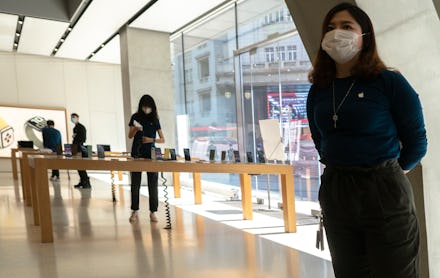You can now ask Siri if you have coronavirus and she'll assess your symptoms

The U.S. healthcare system is in danger of being overwhelmed due to the quickly climbing number of coronavirus cases around the country. The private sector is jumping in to help, including a number of big tech companies that are launching chatbots and more.
Over the weekend, Apple and Microsoft followed in the footsteps of Alphabet's Verily by launching their own tools to help people screen themselves for the coronavirus in an effort to lessen the number of people showing up to hospitals for testing.
Now, if you ask Apple’s Siri, "Do I have the coronavirus?" or "How do I know if I have coronavirus?", the virtual assistant will invite you to take part in a short questionnaire. It asks if you're exhibiting any symptoms, like fever, dry cough, or shortness of breath. If you say your symptoms are life-threatening, Siri will direct you to call 911.
All of Siri's answers are drawn from the U.S. Public Health Service and the Centers for Disease Control and Prevention. According to CNBC, it is only available in the U.S and it's unknown if Apple plans to expand the service internationally.
This weekend, Microsoft also introduced Clara, a bot developed in partnership with the CDC. The company noted that having to screen patients to determine who needs "access to limited medical resources" and who can stay home creates a "bottleneck that threatens to overwhelm health systems coping with a crisis."
That's where Clara comes in. By using the CDC's own protocols, people are able to assess themselves from home. In its statement, Microsoft hoped that Clara will "help the CDC and other frontline organizations respond to these inquiries, freeing up doctors, nurses, administrations, and other healthcare professionals to provide critical care to those who need it."
Right now, Clara is available on the CDC's website.
Neither Siri nor Clara are intended to be used for diagnostic purposes. They're both meant to help people determine if their symptoms align with the coronavirus and if they should seek medical care.
While both of these systems do hold the potential to help ease the crisis, big tech isn't going to solve the pandemic on its own. It is still up to the government to start doing better, like, for starters, distributing more tests and getting medical equipment to the lifesaving frontline workers who need it. But with a president who has openly contradicted healthcare officials and is currently reassessing the social-distancing measures that health officials consider crucial for fighting the virus, that may be a tall order.